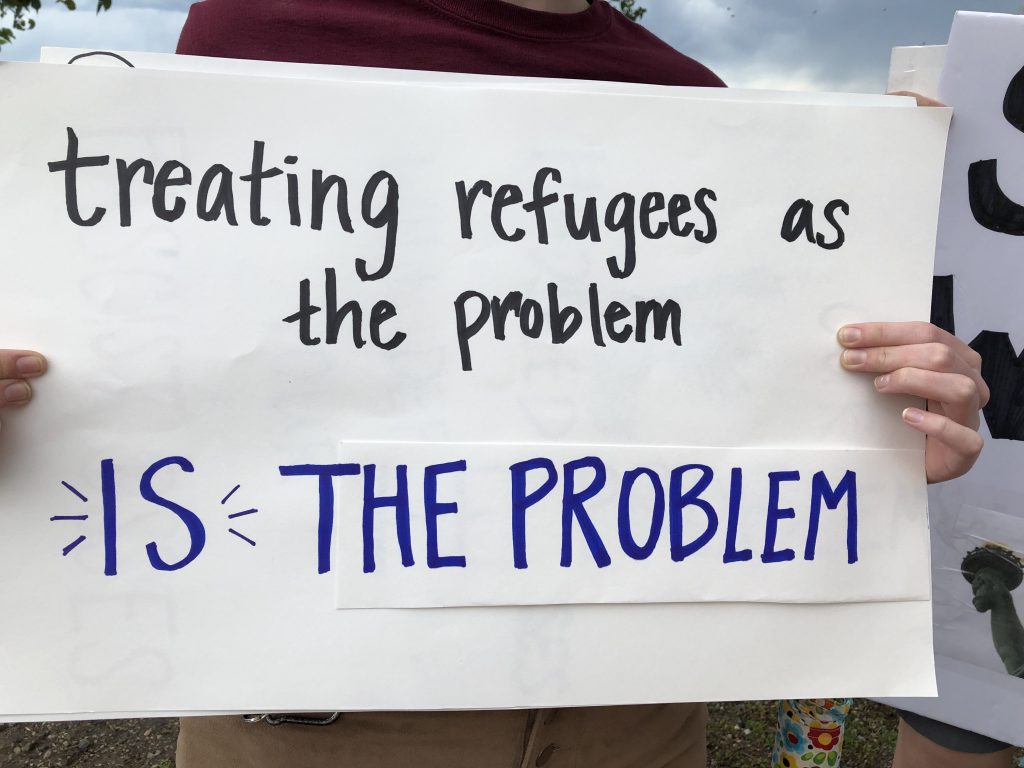- The Rembis Report and Other Fascinating Topics
- Posts
- The Rembis Report and Other Fascinating Topics - Volume CVI
The Rembis Report and Other Fascinating Topics - Volume CVI
Plight of the Unbound - Part IV

This newsletter is the fourth of six weekly editions in a series about homelessness, vagrancy, nomadic lifestyle, human emigration, and definitions of freedom.
Once you have homeless people in your vicinity what do you do?
If you work for the state of Israel, your job might be to tear up the streets to deter people from squatting in West Bank, like this guy with earth-moving equipment.
But do those people count as homeless? Isn’t that like a war thing?
If they were squatting to begin with, they were homeless.
If you are a county in California which pays for consultancy services from Mainstream Unlimited, you might get a page of advice which swings the pendulum of opinion toward homelessness being a festering disease that plagues the streets and is tough to combat. They do make it clear that the only solutions they have for dealing with homeless populations are merely deterrents and they can’t solve anything, but if you put up some lights and signs and act as a nuisance to people living on the street, that might help keep your business safe.
What if they aren’t on your property, but just - like on the street? What can you do about that?
Well, if they aren’t exactly on your property, but just nearby, say, right across the border, just don’t let them in. Or just let in those who can afford a smart phone and use the new Customs and Border Protection app, CBP One. No phone, you say? No app for you. You had better go get a phone. And by the way, good luck!
Hey Mike, not sure those people trying to cross the border are necessarily homeless. They just want to live in the United States. Can’t they just go back home? Do they really count as homeless if they are on the move?
Not everyone shares the same definition of homelessness. Numbers can be way off, but no matter how you tally it up, even the smallest confirmed numbers are staggering. Imagine if the margin for error could triple. It easily can, and does, in places like the United States.
Just like the number of homeless people varies, based on who does the counting, and how they do it, so do the reasons for people being homeless.
When I was hitchhiking around the country at age 20, I found myself among friends in New Hampshire. Young guys, like myself, who I made friends with, who took me in, helped me get around Manchester to find work. It was a fun summer.
I got a couple of jobs pretty quick, working at a restaurant as a dishwasher, and at a maternity store building cribs and making deliveries. During the interviews in finding those jobs, both employers asked me how I showed up in New Hampshire. I boasted of my adventurous spirit and my commitment to hard work and they hired me. But, one thing that Mr. Resnick at Tiny Totland, and Mr. Silver at The Yard were both concerned about was, if I had been recently released from the local mental facility that closed that summer.
I had not.
In 1981, President Ronald Reagan repealed legislation for providing help to the mentally ill, and a cascade of facility closures soon followed. Little did I know that the timing of the closing of the local facility in Concord, NH (in 1985) coincided with my appearance in town. Both employers were noticeably uncomfortable during the interview process, pressing me about where I was from, to make sure that I was not lying about having just been set free from the hospital. Not only did I have to compete with other qualified candidates to get hired, but also with the prejudice and stigma of mental illness and homelessness. The streets were suddenly filled with panhandlers.
The deinstitutionalization of mental health facilities bolstered the idea that homeless people were mentally ill because so many people were pushed out into the street with no place to go. They had absolutely no safety net. They were already unstable and then, simply set free. They shut the facilities, opened the doors, and just let everyone go.
They went everywhere.
This contributed to the biggest myth about homelessness - that it is a result of mental illness, when in fact, homelessness is more likely to cause mental illness than mental illness is to cause somebody to become homeless.
Not having a support system, a place to go, to sleep, to bathe, to relax, is stressful. For anyone with their faculties intact beforehand, suddenly having to deal with daily rejection and no place to go, being unable to sleep comfortably, rest, have decent meals, and the ability to bathe and toilet properly takes a mental toll. When it goes on too long it can drive somebody nuts.
Luckily, there are support systems in place, but some are only temporary bandages for the problem at large. How do we find shelter for everyone who needs it? A handful of countries are actively aggressive in their fight against homelessness. Finland, Denmark, Japan, Singapore, and Canada adhere to a strategy of getting people off the streets and into homes in order to keep them housed. This tack appears to be working. As a result, these countries have some of the lowest rates of homelessness worldwide.
The United States (the world’s richest country) has not implemented any plans as robust as those with enviably lower homeless rates. Because, as George Carlin told us over 30 years ago, there is no money in it.
In America’s sparkling gem of the Pacific, Hawaii, the homeless rate among native Hawaiians (whose ancestors lost their islands to deceptive practices of colonialism) is far above those (both Native Americans and other displaced people) in other states. This is only because they are poor. In places like Hawaii, Los Angeles, San Francisco, New York, and Miami, the poor have been eclipsed so heavily by the shadow of prosperity, the economics of living in these places forces those with incomes below the national average into poverty. Many people live a paycheck away from homelessness. One financial misstep or hardship and they can be on the street in a matter of days.
This keeps happening. Not just in America, but everywhere. The underprivileged, mostly through no fault of their own, due to circumstances beyond their control, being in the wrong place at the wrong time, will find themselves homeless and forced into a nomadic lifestyle.
Yet, the homeless gather together. They seek community. Even when bound by drugs and alcohol, they find camaraderie, and will pack makeshift tents into parks, along city streets, upon riverbanks, inside abandoned buildings and forgotten underground passageways. They make their own rules and find ways to survive.
You have heard that many unfortunate people end up on Skid Row. Whether or not you have wondered why they call it that, Skid Row is a dedicated place name in downtown Los Angeles epitomizing homelessness and vagrancy. Take a look on Google maps. Grab that little guy icon in the lower right corner and drop him anywhere in the city to take a tour. Cruise the avenues on your computer screen through the safety of street view. Many of the maps are as recent as February 2023. It is a true depiction of the neighborhood on a typical afternoon.

Skid Row - Los Angeles
I had once heard that Skid Row was an actual street, named after the stacks of pallets alongside trucking warehouses. That may have some truth to it, but the actual history of Skid Row is that the term was born from the lumberjack camps of the Pacific Northwest. It goes back to the 1850’s, when logs were hauled out of the forest on a “skid road.” During the great depression of the 1930’s, when a fellow was down on his luck, he may have “hit the skids” or wound up on Skid Row. So the name stuck.
And people keep gravitating toward these already destitute places only because they are rejected elsewhere. So, Skid Row and places like it will seemingly keep teeming with street life, because - where else would they go?
Instead of seeking out ways to deter the unfortunate, we can choose to help. Houston and San Diego both implemented a Housing First strategy over a decade ago. Houston succeeded in cutting their homeless population in half by 2020. San Diego did not fare as well.
I have no specific request for you to do anything. I just want you to consider the issue at hand. Know that this is a huge problem steeped in complexity. Whatever little bit you do will be nice, but it will not be enough.
So, what is the solution, Mike?
At the moment, I would not venture to guess. As I have stated before, only a Herculean effort on the part of governments can help to fix this, and that effort will not come about without a monumental shift in attitude, worldwide, about homelessness. It is going to take a lot of bureaucracy, and accepting that both migrants and domestic homeless everywhere, will not necessarily adhere to geographic or religious boundaries by force, but when given an option which shows respect for their humanity, they will adhere to common sense.
People stay wherever they feel safe.
Thanks for reading.
If you are new to the Rembis Report and would like to read any of the previous issues, PLEASE CLICK HERE to access the archives. To read it from the beginning, PLEASE GET A COPY of The Rembis Report: An Observation.




